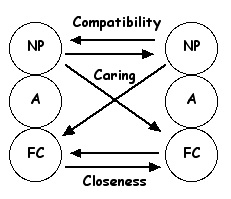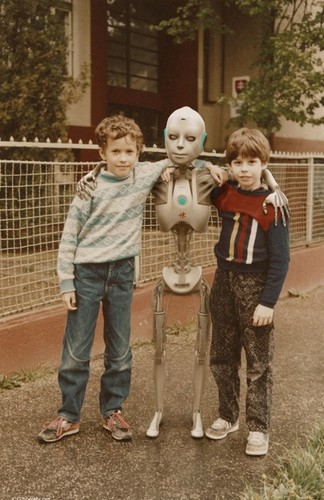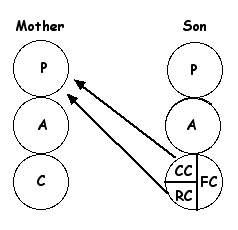Many years ago when I first completed my psychology degree I managed to meet up with another psychologist, who was a child psychologist. She was very experienced in the area and had a very well decked out play therapy room. I worked with her and the children in the play therapy for two years. I didn’t get paid but got the supervision and experience for those two years in exchange. That hands on training was invaluable and has served me very well over the years.
Since then I have seen children and their parents in my own therapy with them. When seeing a child on an individual basis for many years I would almost always want the parents to leave the room at some point often for most of the session. This allowed me to interact with the child without the parents there. Then commonly I would get the child to leave the room and then talk with the parents.

In recent years I have done that much less and now see the parent(s) with the child in the room all together. In essence I am doing a sort of couples therapy by getting them to interact with each other and then making my therapeutic interventions with them as they transact right in front of me.
Working at a transactional level.
When working with a couple, say hubby and the missus, at a transactional level I will keep in mind the transactional diagram that highlights the three main features of a functional relationship.

With a struggling couple I will see if they have a problem with their Parent ego state compatibility. That is, do they have big differences in their values and goals about life? This is a common reason for argumentative couples to enter therapy and the big three Parent values differences are - money, sex and children. Also do both parties display caring and kindness to the other party and do they engage in some Free Child to Free Child exchanges at times.
If I am doing couples therapy with a mother and a son, at a transactional level, what are the transactions that will define a functional relationship between those two people. What transactions will make for a workable relationship between them. I came up with the following three transactional diagrams.

First one is wanting to see some good Free Child to Free Child interaction between mother and son. This is essential in any relationship really but for the attachment process between mother and son to proceed and be maintained then this transaction is pivotal. With busy mothers and fathers these days this type of transacting often gets a low priority and can sometimes be seen as a bit of time wasting. However from a psychological point of view and in terms of building a functional and healthy parent-child couple it is crucial.
In some respects this is the most difficult of all transactions for a parent to do with a child because in one way it is antithetical to being a parent. Most parents don’t understand what this transaction actually means. If they are presented with this idea then they will usually say something like, “We can go to the movies together”, or “We can go camping together”. These are not Free Child to Free Child interactions, instead they are two people doing an activity together.
The FC to FC exchange is where a mother interacts with her son so that she personally gets something out of it. In this sense she is not being a parent because she is not doing it for the child's welfare or benefit but she is doing it for her own personal gain irrespective of the child. It is in essence an emotionally selfish act on the mother’s behalf. It is certainly not the act of her being a good parent in the usual sense of the word as she is using the child to get her own Free Child needs met.
When a mother suggests an activity that might be a Free Child transaction, one needs to ask a question. What’s in it for her? In the answer there must be some Free Child need of the mother that is getting satisfied. If there isn’t then it’s not an FC to FC transaction.
The advantage for the child is it sees mother getting her own Free Child needs met by interacting with the child. A most positive psychological experience for the child indeed.

In this picture, you can see from the mother’s face and body language that she is getting something personally out of it. A FC need in her is being met by the interaction with the child.
Consider this. You are hanging out with someone and you can see how much they enjoy you and your company what does that mean for you and about you? If you have a young child, to whom mother is the most important person in the world, and it sees the same in her what is that child going to conclude about itself, her and the relationship?
The problem with Free Child is you can’t fake it. If she does not get a Free Child need met from her son then she can’t pretend to for the child’s well being. Hence we have one of those dilemmas of human nature. One of the healthiest things mother can do for a child is have such Free Child interactions, but if she does not feel that way then that can be quite psychologically destructive to the child and she can’t pretend. If she tries to, as can often happen, then the situation ends up worse.

What is it like to be friends with someone who tells you they like you when in fact they don’t? Over time you pick up the inconsistency, end up confused and worse off than if they had been straight with you in the beginning. Of course a young child will feel the same if mother tells it, it is liked and wanted when in fact it isn’t. However the psychological damage is much greater for the child than if it just happens to be between two adult friends.
Obviously there needs to be Adult to Adult communication as well. This of course is effected by the age of the child and how rudimentary their Adult ego state is. By the time the child is say 8 or 9 some serious Adult communication should be occurring. However even with quite young children one would be wanting to see mother asking the child how it likes its eggs cooked, or what colour shirt it likes to wear and so forth. In most parent-child coupling this is under done. The mother or father have many more opportunities to ask an Adult question of the child rather than simply making the Adult decision for the child.

In such a functional couple the mother would also be displaying a good amount of Nurturing Parent and Controlling Parent to the child. And on the other hand one is wanting to see a lack of such transactions from the child to the mother
Again this varies on the age of the child, but you are not wanting to see any significant degree of the child parenting the parent. For instance one sometimes hears of a mother who will discuss (seek counsel) her marital problems with her son or daughter.
If this happens from a young age then it can be particularly psychologically devastating for the child. It can lead to some quite serious personality maladjustment.

Finally one is wanting to see a good level of Conforming Child and Rebellious Child responses from the son to the mother. This is often good information to pass onto a mother or father as most often parents will see a RC response from a son as all bad. Very few parents will seek counselling because their child does not display enough Rebellious Child ego state. Very few parents will seek counselling because their child displays too much Conforming Child ego state.
In some families there can be one child who protests or fights the system loudly and the other child is quiet. Not uncommonly it is the quiet child who is more psychologically damaged. So in this mother and son couples counselling if the mother can see the son’s RC as a positive thing (at times) and then she is more able to respond to it in a productive way.
Again on the other hand one is wanting to see a lack of CC and RC responses from the mother to the son. One would not want to see this happening much at all as the parent is then behaving in a child like manner in her parenting. For instance one sometimes hears a mother say, “Johnny bit me so I bit him back”. A child like response indeed from mother.
Child-parent couples therapy
In marital couples therapy both adults can speak for them selves and say what they are wanting. With a child and parent obviously the child is far less articulate so in one sense the therapist becomes the advocate for the child. The therapist needs to be able to ‘hear’ what the child is wanting from the relationship and then state it to mother in a way that will be heard by her. The therapist becomes in one way the child’s Adult ego state in the couples therapy.
Graffiti
Good posts on counselling parent and child Grafitti. Much can be gained from working with that relationship. Its kind of like a wholistic appraoch rather than hoping that the child will unlock aspects of their subconscious world in time.
ReplyDeletekenoath
Ok. More free child stuff needed. Thank you... again *giggles*
ReplyDeleteHello Kenoath and roses,
ReplyDeleteI suppose one could call it that a more wholistic approach,
and I agree FC is needed more
Graffiti
I keep listening to the news speak about getting free online grant applications so I have been looking around for the best site to get one
ReplyDeletenetwork
The factors several might consider couples counselling are commonly different. Sometimes there are family members extensive problems such as problems with the kids (or arguments on how to self-discipline them) or justifications on how the family members should be run. Other periods the problem may relate to only one individual in the relationship. This could be anything from a psychological sickness to a consuming disorders or perhaps a problem with misuse of some type.
ReplyDeleteCouples Counselling Sydney